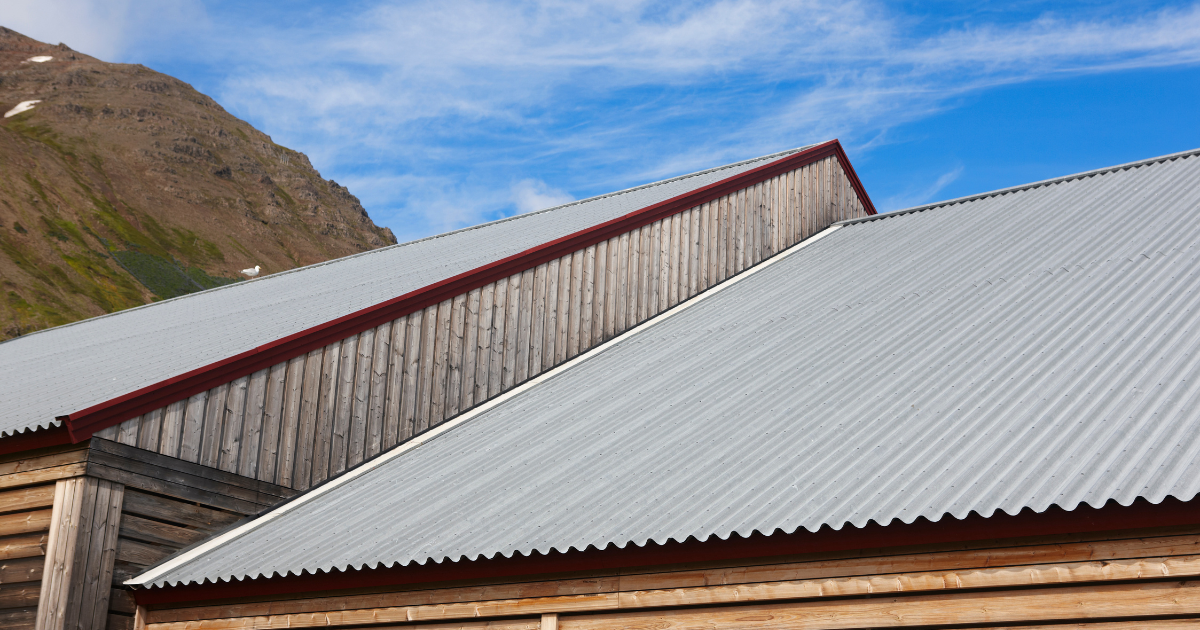
A damaged or outdated warehouse roof isn’t just a maintenance headache – it’s a serious threat to your bottom line. Every day, enrepreneurs across the country face production halts due to water intrusion, inventory damage from unexpected leaks, and worker safety concerns caused by deteriorating roofing structures. The financial impact goes beyond repair costs to include lost productivity, compromised inventory, and potential liability issues.
For small business owners managing industrial spaces, the stakes couldn’t be higher. Your roof is your first line of defense and its failure can trigger a cascade of operational problems. Whether you’re dealing with an aging roof showing signs of wear or planning a new facility, the decisions you make today will impact your business for decades.
We understand these challenges intimately. With over 20 years of hands-on experience delivering industrial roofing solutions, we’ve helped countless warehouse owners transform their concerns into long-term business advantages. Our team specializes in large-scale roof installations that stand up to harsh weather, extreme temperatures, and the day-to-day demands of busy industrial environments.
In this comprehensive guide, we’ll walk you through everything you need to know about warehouse roof options – from material selection and design considerations to installation processes and maintenance strategies. By the end, you’ll have the knowledge to make confident decisions that protect both your facility and your business operations for years to come. Ready to protect your business from the top down? Let’s get started.
Choosing the Right Roofing for Warehouses
A warehouse roof has to do more than just cover your operations. It needs to be durable, energy-efficient, low-maintenance, and scalable. With large surface areas and structural complexities, warehouse roofing requires careful planning and expertise. Let’s explore the most effective options available today and their specific advantages.
Metal Roofing Systems
Commercial metal roofs stand as a premier choice for industrial applications, offering exceptional durability when properly installed and maintained. These systems excel in several critical areas:
Strength and Resilience: Metal roofing withstands extreme weather conditions, including high winds, heavy snow loads, and intense sun exposure. Its non-combustible nature also provides superior fire resistance – a crucial safety feature for warehouse environments.
Energy Efficiency: This material incorporates reflective roof coatings that significantly reduce heat absorption. According to the Cool Roof Rating Council, this natural cooling effect can decrease summer cooling costs in many facilities.
Structural Versatility: The lightweight nature of metal reduces structural load requirements, making it suitable for both new construction and retrofitting existing buildings without costly structural reinforcements.
Environmental Benefits: Most metal roofing contains recycled content and is 100% recyclable at the end of its service life, reducing landfill impact. Its longevity also means fewer replacement cycles and less construction waste.
Solar Integration Potential: The stable, durable surface of metal roofing creates an ideal platform for solar panel installation, supporting businesses looking to reduce energy costs through renewable energy.
While the initial investment in metal roofing typically exceeds some alternative systems, the long-term value proposition becomes clear when considering its extended lifespan and reduced maintenance requirements.
Thermoplastic Membrane Systems (TPO)
TPO (Thermoplastic Polyolefin) membranes have gained significant popularity in the warehouse roofing sector, particularly for low-slope applications. These single-ply systems offer compelling advantages:
Superior Weatherproofing: The heat-welded seams create a monolithic surface that prevents water intrusion and resists weather impact on roofs more effectively than traditional mechanically-fastened or adhesive-based systems.
Chemical Resistance: These membranes resist a wide range of chemicals, oils, and pollutants – making them ideal for facilities in industrial areas or those with rooftop HVAC equipment that might leak fluids.
Energy Efficiency: The highly reflective white surfaces of TPO membranes reflect solar heat, dramatically reducing cooling loads during warmer months.
Installation Efficiency: These lightweight materials allow for faster installation with less labor, reducing both installation costs and business disruption during roofing projects.
Flexibility in Varying Temperatures: Quality TPO membranes remain flexible in cold temperatures and resist thermal expansion and contraction stresses that cause other materials to crack or split.
For warehouse owners seeking a balance between performance and value, thermoplastic membrane systems offer compelling benefits with typical long lifespans when properly installed and maintained.
Silicone Roof Coating Systems
For warehouse owners seeking to extend the life of an existing roof without a complete tear-off, silicone coating systems offer compelling advantages:
Seamless Protection: Applied as a liquid that cures into a seamless membrane, silicone coatings eliminate the joints and connections that are common failure points in traditional roofing.
UV and Weather Resistance: Silicone naturally provides uv resistant roof coatings that prevent degradation from sun exposure and maintain their protective properties despite years of weather exposure.
Energy Efficiency: White silicone coatings reflect solar radiation, significantly reducing cooling costs during summer months.
Minimal Business Disruption: The application process generates less noise and odor than traditional roof replacements, allowing business operations to continue with minimal interruption.
Extended Roof Life: A properly applied silicone coating system can add decades to the service life of an existing roof at a fraction of replacement cost.
Renewable Protection: When the initial coating reaches the end of its service life, applying a new topcoat can restore protection without removing the existing system.
Each warehouse is unique, and no one-size-fits-all solution exists. The right system depends on your roof slope, local climate, building usage, and budget. After reviewing these warehouse roof options, you might wonder which factors are most important in making your selection.

What Makes Durable Industrial Roofs?
Durability in industrial roofing isn’t just about the material—it’s about the entire system working together to withstand time, weather, and wear. Preventing water damage in commercial roofs requires a multi-layered approach.
Waterproofing Integrity
Water intrusion remains the primary enemy of roofing systems, with even minor leaks potentially causing significant damage over time:
Seamless Technology: Our silicone coating systems create continuous membranes without the joints and connections that typically fail first in traditional roofing.
Proper Slope and Drainage: We analyze existing drainage patterns and often enhance them during installation, eliminating areas where water might pond and accelerate deterioration.
Flashing Excellence: We pay particular attention to roof penetrations, edges, and transitions, using advanced flashing techniques and materials.
Moisture Detection Systems: For critical facilities, we offer embedded moisture detection technology that alerts facility managers to potential leaks before they cause visible damage.
Climate Resilience
Your warehouse roof faces extreme temperature variations, UV exposure, wind forces, and sometimes hail or debris impact.
UV Radiation Defense: Our high-performance coatings and membranes incorporate advanced UV stabilizers that prevent premature degradation from sun exposure.
Thermal Movement Accommodation: We design systems that accommodate the natural expansion and contraction of roofing materials and structural components during temperature swings.
Wind Uplift Resistance: Our attachment methods and edge detailing exceed minimum code requirements to prevent wind damage during severe weather events.
Impact Protection Layers: For facilities in hail-prone regions, we incorporate specialized impact-resistant materials and protective layers that absorb and dissipate impact forces.
Material Performance Synergy
The most durable industrial roofs leverage the strengths of multiple materials working together.
Reinforced Membranes: Our high-performance systems often incorporate reinforcement layers that enhance tear strength and puncture resistance without adding excessive weight.
Specialized Adhesives and Sealants: We select bonding materials specifically engineered for industrial environments, ensuring they maintain flexibility and adhesion despite environmental stresses.
Protective Surfacing: Where appropriate, we apply granules, reflective coatings, or sacrificial top layers that shield underlying waterproofing components from direct environmental exposure.
Material Transition Details: We pay special attention to areas where different materials meet, using specialized connection techniques that accommodate their different properties and movement characteristics.
By focusing on these durability factors, we create industrial roofing solutions that consistently exceed expected service life, protecting your facility and your business operations year after year.
Beyond physical performance, your warehouse roof represents a significant business investment. In the next section, we’ll explore how the right roofing choices deliver long-term value and contribute to sustainable business practices.
Long-Term Value and Sustainability
Warehouse owners often view roofing primarily as a necessary expense. However, a strategic approach to industrial roofing solutions transforms your roof from a cost center into a business asset that delivers ongoing returns.
Financial Incentives and Compliance Benefits
Smart roofing choices can unlock additional financial advantages beyond direct energy savings:
Utility Rebate Programs: Many utility companies offer rebates for cool roofing installations that reduce peak energy demand. Our team helps identify and capture these opportunities.
Tax Incentives: Federal, state, and local tax benefits often apply to energy-efficient roofing upgrades. While these programs change periodically, our knowledge of current incentives helps maximize your project’s financial return.
Insurance Advantages: Upgraded roofing with improved wind, fire, and impact resistance can qualify for insurance premium reductions. We provide the documentation needed to demonstrate these improvements to insurance carriers.
Code Compliance Assurance: As energy codes become increasingly stringent, proactive roofing upgrades prevent costly forced compliance measures later. We ensure all installations meet or exceed current requirements with an eye toward future regulatory trends.
Asset Protection and Business Continuity
Perhaps the most significant value comes from what superior roofing prevents:
Inventory and Equipment Protection: Water damage from roof leaks can destroy inventory and damage sensitive equipment. Our systems’ exceptional waterproofing integrity minimizes this risk.
Operational Continuity: Roof failures can halt production and fulfillment operations entirely. The reliability of our industrial roofing solutions dramatically reduces this business interruption risk.
Structural Preservation: By preventing water intrusion, our roofing systems protect the structural components of your building from deterioration, extending the useful life of your entire facility.
Liability Mitigation: Proactive roofing maintenance and upgrades reduce slip-and-fall risks and other safety hazards that could result in costly litigation.

Common Questions About Industrial Roofing Solutions
How long do industrial roofs last?
Depending on the system, industrial roofs can last decades. Our silicone-coated systems offer 20-year leak-free warranties.
What is the best roofing material for a warehouse?
There is no universal best. Metal, TPO, and silicone-coated systems are all excellent depending on your building needs.
Can I install a new roof over an old one?
In many cases, yes. Roof restoration with coatings can be applied over existing systems, avoiding a full tear-off.
Is roof coating really worth it?
Yes. It extends roof life, prevents leaks, and reflects heat, reducing energy costs.
Protect Your Warehouse from the Top Down
Industrial roofing solutions require strategic thinking, durable materials, and experienced installation. For warehouse owners and managers, the right roofing decision can pay off for decades.
Whether you’re facing immediate leaking challenges, planning preventative upgrades, or designing a new facility, our team at Silicoat Roofing provides the expertise and solutions you need to make confident roofing decisions.
As Michigan’s trusted industrial roofing specialists, we understand the unique challenges local warehouse owners face. Ready to discuss your warehouse roofing needs? Contact us today for a complimentary consultation and roof assessment. Our experts will help you identify the most effective approach for your specific facility, timeline, and budget.
About the Author
Rick Dodaj is the founder and CEO of Silicoat Roofing, specializing in commercial roofing solutions that protect businesses and their investments. With extensive experience in commercial roofing, Rick leads a team dedicated to providing cost-effective, long-lasting roofing solutions. Connect with him on LinkedIn to learn more about commercial roof maintenance and protection strategies.


 Previous Post
Previous Post Next Post
Next Post